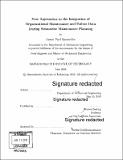| dc.contributor.advisor | Warren Seering. | en_US |
| dc.contributor.author | Sponseller, Aaron Paul. | en_US |
| dc.contributor.other | Massachusetts Institute of Technology. Department of Mechanical Engineering. | en_US |
| dc.date.accessioned | 2019-09-26T19:36:59Z | |
| dc.date.available | 2019-09-26T19:36:59Z | |
| dc.date.copyright | 2019 | en_US |
| dc.date.issued | 2019 | en_US |
| dc.identifier.uri | https://hdl.handle.net/1721.1/122310 | |
| dc.description | Thesis: S.M., Massachusetts Institute of Technology, Department of Mechanical Engineering, 2019 | en_US |
| dc.description | Thesis: Nav. E., Massachusetts Institute of Technology, Department of Mechanical Engineering, 2019 | en_US |
| dc.description | Cataloged from PDF version of thesis. | en_US |
| dc.description | Includes bibliographical references (pages 65-66). | en_US |
| dc.description.abstract | Planning for maintenance periods for U.S. Navy submarines is difficult due to schedule and cost constraints, operating cycles, and logistical concerns. Organizational maintenance and failure data is vital to understanding trends of failures among the various classes of submarines. This thesis investigates the processes by which maintenance and failure data is collected, analyzed, and administered throughout the planning process. First, the relationship between organizational and depot level repair work is investigated with respect to how each level impacts the other. An original, multiple linear regression is used with little success to describe how maintenance completion rates affect failures of equipment; thus invalidating this process as beneficial. Additionally, an improvement in depot level completion of maintenance and how it affects equipment start-up is described. Next, the Navy's maintenance improvement process, known as Reliability Centered Maintenance (RCM), is reviewed in order to suggest improvements to their use of organizational data. This process utilizes a variety of experts in maintenance, and submarine operations and their knowledge can be better fused with data sources for greater planning efficiency. Finally, the data collection process, while electronic, is cumbersome for engineers to use effectively during their planning process. Higher quality content will allow engineers to better understand the root causes for failure which creates more informed planning for future maintenance periods. | en_US |
| dc.description.statementofresponsibility | by Aaron Paul Sponseller. | en_US |
| dc.format.extent | 66 pages | en_US |
| dc.language.iso | eng | en_US |
| dc.publisher | Massachusetts Institute of Technology | en_US |
| dc.rights | MIT theses are protected by copyright. They may be viewed, downloaded, or printed from this source but further reproduction or distribution in any format is prohibited without written permission. | en_US |
| dc.rights.uri | http://dspace.mit.edu/handle/1721.1/7582 | en_US |
| dc.subject | Mechanical Engineering. | en_US |
| dc.title | New approaches to the integration of organizational maintenance and failure data during submarine maintenance planning | en_US |
| dc.type | Thesis | en_US |
| dc.description.degree | S.M. | en_US |
| dc.description.degree | Nav. E. | en_US |
| dc.contributor.department | Massachusetts Institute of Technology. Department of Mechanical Engineering | en_US |
| dc.identifier.oclc | 1119389425 | en_US |
| dc.description.collection | S.M. Massachusetts Institute of Technology, Department of Mechanical Engineering | en_US |
| dc.description.collection | Nav.E. Massachusetts Institute of Technology, Department of Mechanical Engineering | en_US |
| dspace.imported | 2019-09-26T19:36:57Z | en_US |
| mit.thesis.degree | Master | en_US |
| mit.thesis.department | MechE | en_US |
